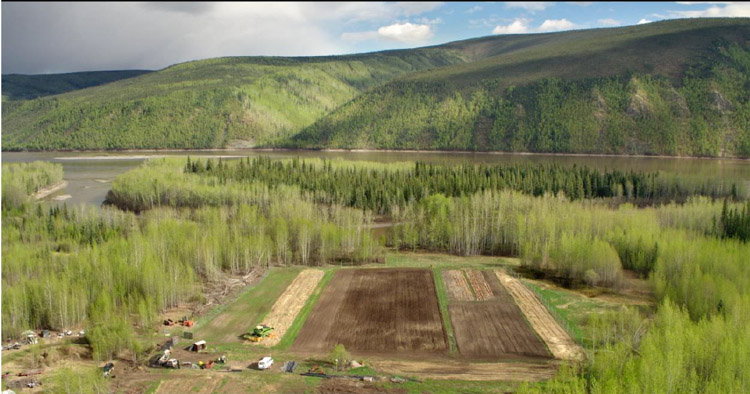2021/8/24
Food Security
brought to you in part by

NFB'S 'LIVING ON THE LAND AT 64�N', OFFERS FOOD FOR THOUGHT
ON LIVING WITH CLIMATE CHANGE
By Suzanne Forcese
At the far-flung edge of Canada’s boreal forest, outside the tiny sub-Arctic town of Dawson City, Yukon, where less than 10% of food is sourced locally, a handful of unlikely farmers are growing everything from snow-covered Brussels sprouts to apples.

Once the center of the Klondike Gold Rush, off-grid, in the Traditional Territory of the Tr’ondek Hwech’in, the TH Farm, nestled on the banks of the Klondike River – now the site is at the heart of a bold new project to help with the revival of northern farming, improve food security in the North, and develop First Nations working farm north of the 60th parallel in Canada. Photo NFB
Over the course of a year film-maker, David Curtis, together with Yukon film-maker Andrew Connors, follows these resilient, unassuming farmers – including a German immigrant, a young family that taps birch trees for syrup, a First Nations youth, and a matriarch who can shoot and quarter a moose – in Sovereign Soil, a National Film Board of Canada Production.
Curtis tells us, “Andrew and I were both interested in the back-to-the-land movement and how it’s played out in the Yukon. We wanted to look at what makes people come into the bush and eke out a subsistence living. It’s hard work surviving out there. Lots of people come north with this romantic notion of living in the wilds, but as soon as the first snow comes, they tend to scatter. We’re looking at those that stuck it out.”
Curtis who has been living off-grid for the past 21 years—working as a commercial salmon fisher, carpenter, artist, and teacher, says, “Living here, I became more and more interested in the principles and philosophy behind living on the land and sustainability.
“Our Western, colonial frame of mind has imposed itself on Indigenous ways of life.
I’m interested in how we can have a more equitable relationship with the planet. In Sovereign Soil, I am looking at all this through food production."
A wide demographic make up those who have “stuck it out”. A former hippie from downtown Toronto who came north and ended up becoming a successful market gardener; a DIY German immigrant who is a third-generation horticulturist exploring the limits of sustainability in Canada’s North; a young family living off the grid but still fully connected with Wi-fi; and some from an older generation where back-to-the-land is about survival and self-sufficiency more than community.
Along with the family of contemporary farmers, the film also features the TH Farm, established by the First Nation in 2014 to create a sustainable, local food supply.
“We discover that there is much to be learned from these people and their way of life, especially the Tr’ondek Hwech’in First Nation, who have lived contentedly in this challenging environment for thousands of years.”
“Agriculture is one of the biggest polluters in the world. Our modern way of producing food is really not sustainable. As one of the characters says in the film, the only really sustainable way is hunting and gathering. But now we have the local Tr’ondek Hwech’in First Nation, who once were hunter gatherers, turning to agriculture for food security. This raises very important questions about community, our changing connections to land, and self-sufficiency."
Curtis believes our disconnect from the land is at the core of our potential demise.
“From the disrespectful ways we consume resources and pollute land, to the unprecedented issues and catastrophes we’re facing due to climate change. People don’t spend time experiencing the seasons and connecting with their environment.
“We don’t realize we are still part of nature and so dependent on it until it slaps us in the face and our home is flooded, or a forest fire burns us out. We have to have a more reciprocal relationship with nature to get back in touch with what is happening around us.”
“I always intended the film to raise more questions than answers. I hope people leave thinking more about their consumer impact on the environment, their relationship to the land, and about the people and industries that supply them with food.” -- David Curtis, film-maker
Sovereign Soil explores the myth of the rugged individual living “off the land” through the lens of contemporary people who are actually doing it.
The NFB documentary will be available for free streaming in Canada on NFB.ca
Starting September 7, 2021.
|